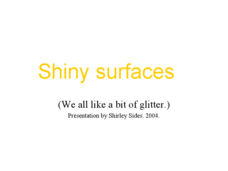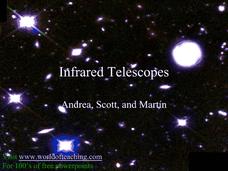Curated OER
Reviewing Mitosis/Mitosis
There are technically two presentations in this collection of slides. The first presentation is a single-slide comparison of plant cell division and animal cell division. The second focuses on the steps of meiosis and the genetic...
Curated OER
Nutrition
With a little improvement, this slide show can support your introduction to nutrients. Bullet points list how the human body uses the macronutrients, however, the micronutrient slides are incomplete. You will need to insert definitions...
Curated OER
The Five Kingdoms
An overview of the five kingdoms within the biological classification system is presented in this set of five slides. The first lists the objectives of the slide show, and the second gives general characteristics of plant, animal, and...
Curated OER
Respiratory System
Biology classes can survey the respiratory system with this PowerPoint. It is rudimentary in its presentation: plain white with simple black fonts and no graphics other than a diagram of the respiratory system on the title slide. The...
Curated OER
Water Molecules Can
On its own, this is not an exciting presentation on the properties of the water. It consists only of two slides: the title slide, which informs the viewer that water molecules have hydrogen bonds, and another slide, which lists four...
Curated OER
Eukaryotes vs. Prokaryotes
Seven simple slides list characteristics of eukaryotic and prokaryotic cells. After viewing this presentation, future biologists will be also able to name the unique characteristics of plant, animal, and fungal cells. Ideally, you would...
Curated OER
Green Plants
Beginning botanists are introduced to the world of plants with this PowerPoint. Some of the information is most appropriate for primary learners, such as the needs of a plant. Some of the information, however, is more directed at...
Curated OER
Shiny Surfaces
Here is a simple PowerPoint to support your lesson on the behavior of light. As you go through the slides, use real examples of dull and shiney materials for your elementary learners to view. Use the torch, sun, lamp, candle, and bulb...
Curated OER
Batteries
What are batteries? That is the question to be answered by this slide show. Battery facts, types, and uses are covered, but not in detail. The presentation concludes with a fill-in-the-blank paragraph about the flashlight, also known in...
Curated OER
Where do Butterflies Come From?
After tapping into their memories or experiences of baby animals, viewers delve into the insect life cycle of a butterfly and the amphibian life cycle of a frog. When exploring life cycles, show this presentation to your elementary life...
Curated OER
Water
The water cycle is explained in five steps in this PowerPoint. Individual slides also show color graphics of how we use water at play, at work, and at home. Tasks are given throughout the presentation. One of them asks learners to...
Curated OER
Autograph Hunt Circuits Symbols
Use this presentation as a way to review circuits in the classroom. It could provide a jumping-off point for a discussion of this topic, or as a review once the main concepts have been covered. Augmenting it with more information would...
Curated OER
Solids, Liquids, Gases
There are three states of matter, liquid, solid, and gas. Each are covered briefly in this very short presentation. The energy cycle is depicted in a chart and the states of matter are defined but this isn't a complete or...
Curated OER
The Scientific Method
If the steps that you follow for the scientific method are as follows, this presentation can be useful: observation, question, hypothesis, method, result. Unfortunately, not every scientist or teacher uses the same terminology, The...
Curated OER
Chesapeake Bay
The Chesapeake Bay is the largest estuary in the United States. Explore its origins, organisms, and contributing rivers with this PowerPoint. It opens with several slides of general information on the formation of estuaries, then it...
Curated OER
Energy - What Are Potential and Kinetic Energy?
Beginning with a review of seven types of energy, this presentation teaches the concepts of kinetic and potential energy. Using a roller coaster as the object in motion, a brief explanation is offered. The grainy photographs may detract...
Curated OER
Homeostasis and the Human Body
Don't expect much from this presentation. It contains five slides in addition to the title. The first describes homeostasis, the second states that it operates at all levels and lists the biological hierarchy, the third gives three...
Curated OER
What Do Your Know About Matter?
Perfect for 1st grade students, this presentation contains information on the various states of matter, what affects them, and how they change. Using clear language and simple images, these slides will be there to guide any lesson or...
Curated OER
Gravity: What is It?
Explore gravity, force, and mass as some of the natural forces in the universe. Each slide provides information and examples that describe each concept. Learners are encouraged to throw a basket ball and a bean bag into the air to...
Curated OER
The Happy Game: The Water Cycle
Make your students 'happy' about understanding the water cycle with The Happy Game; where young learners put their knowledge to the test to answer questions about evaporation, condensation, and precipitation. Tip: Use this game prior to...
Curated OER
Life Cycle of a Frog
Are you teaching a unit on the life cycle? You can use this informative PowerPoint to explain the life cycle of a frog. The ten slides walk students through each step of a frog's life cycle, starting with the adult frog laying eggs. This...
Curated OER
Our Five Senses
While students are at their desks, you can show this simple PowerPoint about the five senses. Each sense includes an activity for students to complete, like drawing something that smells good. This presentation calls for the following...
Curated OER
Infrared Telescope
Most of the twenty slides in this presentation include photographs or diagrams, making it an eye-catching way to teach about infrared telescopes. The pros and cons of using infrared light to study outer regions of space are explained....
Curated OER
Changes Written in Stone
Earth Rocks! Explore the many properties and types of rocks, where they come from and how they are formed. This resource presents a simplistic overview of the rock cycle. Tip: Bring in samples of sedimentary, metamorphic, and igneous...
Other popular searches
- Earth Science
- Physical Science
- Life Science
- Science Project
- Science Space
- Environment Science
- History of Science
- Environmental Science
- Pe Science
- Family and Consumer Science
- Consumer Science
- Social Science

























